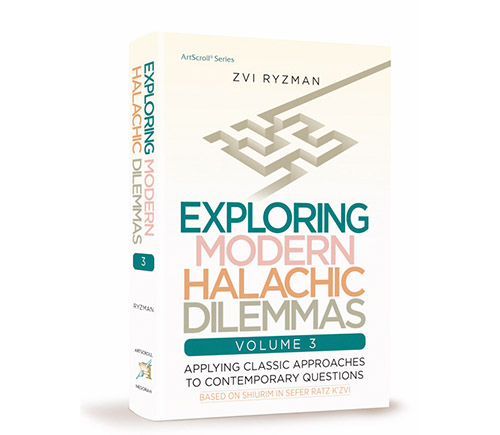
Highlighting: “Exploring Modern Halachic Dilemmas,” Volume 3. by Zvi Ryzman. Artscroll/Mesorah. 2021. English. Hardcover. 304 pages. ISBN-13: 978-1422628041.
(Courtesy of Artscroll) Zvi Ryzman is a phenomenon. He calls himself an ish asakim, a businessman—which he is, and a successful one—but that is his sideline. His first love is learning, and he is an accomplished talmid chacham.
In his new Artscroll book, “Exploring Modern Halachic Dilemmas, Volume 3,” Rabbi Ryzman treats us once again to a fascinating array of halachic discussions, including topics that relate to current issues: Is melacha permitted before havdalah? Should a kattan become intoxicated on Purim? Is one required to fast for more than 24 hours? Can one fulfill pirsumei nisa via Skype? Does ‘lifnei iver’ apply to a meat restaurant during the Nine Days? Have Chazal permitted minor sins to prevent major sins?
Rabbi Ryzman researches, analyzes and elucidates. And when he’s finished, we have a clear understanding of the topic and an understanding of the various halachic approaches. The following is a fascinating excerpt from the book, providing a small taste of the compelling pieces found in this new volume.
Lifnei Iver When Inviting Parents on Shabbos
Rav Moshe Shternbuch (Teshuvos V’Hanhagos 1:358) was asked by a baal teshuvah whether he
may invite his parents for a Shabbos meal if he knows that they will drive home. Is such an invitation a violation of “lifnei iver lo sitein michshol—not to place a stumbling block in front of a blind person?” (i.e., one may not facilitate another Jew’s transgression).
The son added that by inviting them, he is bringing them closer to observance, and, in fact, “he has already seen progress as to how they view religion. He feels (this change in attitude) results directly from inviting them … He wishes to know whether (inviting them for Shabbos when they will drive back) is forbidden on the basis of “lifnei iver.”
Rav Sternbuch responded: “It would appear that the principle of ‘lifnei iver’ parallels (the simple meaning of the verse, which prohibits) causing a blind person to stumble. But in this case, where the son’s intention is only for his (parent’s) good—this is not ‘stumbling.’ This case is like that of a doctor who performs surgery, who clearly is not considered to be injuring his patient. So too, here—he does not mean to cause his parents harm or to give them bad advice, but he, rather, hopes his efforts will guide them closer to the correct path. Although they are mechalel Shabbos as a result of the invitation, it is as if they are harming themselves—and there is thus no prohibition of ‘lifnei iver.’ However, one should constantly warn and notify them of the severity of chillul Shabbos, as well as the sweetness of keeping it. With Hashem’s help, he will be able to bring them back to the right path—and there is no greater fulfillment of kibbud av va’eim (honoring one’s parents) (than bringing them back to observance).”
He then adds: “Elsewhere, I cited the opinion of the Mishna Berurah (Shaar HaTziyun 306:45) that a father is required to concern himself that his daughter not convert, since he is her redeemer and relative. Evidently, there is a special obligation for relatives to concern themselves (for the spirituality of their close ones). Accordingly, even though—in general—there is no obligation to rebuke a mechalel Shabbos b’farhesia, since he is not ‘acting like the ways of your nation’ (see Mishnah Berurah 608 and Beur Halacha ad loc.), nevertheless, with regard to one’s parent who has become assimilated, he is obligated to redeem him. This is based not only on the regular mitzvah of tzedakah—which one is obligated for all poor people in Klal Yisrael—but, rather, due to a special law of redeeming relatives (i.e., akin to the halacha that a relative is obligated to redeem his relative who was sold as a slave to a non-Jewish owner; see Kiddushin 15b). Even if they are mechalelei Shabbos, one must try as hard as possible to redeem them, since there is a special halacha mandating this.”
We see from this discussion that in questions involving a child inviting his non-observant parents, a critical consideration is the fulfillment of the mitzvah of kibbud av va’eim, (which is “one of the most important mitzvos,” and equivalent to honoring Hashem). Additionally, there is a special obligation to restore them to the right path, since this is a form of “redeeming relatives” from their loss of freedom or assets. Although these arguments were applied to a son inviting his parents to a Shabbos meal to address a concern of ‘lifnei iver,’ these considerations must also apply to inviting parents to a Yom Tov meal.










